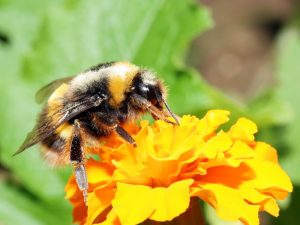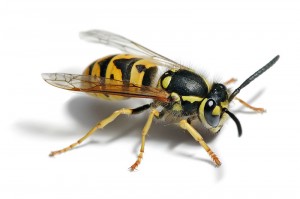Wasps & Bees
In Pests in April, Pests in August, Pests in July, Pests in June, Pests in May, Pests in Spring, Pests in Summer, Wasps
This is the most important time of the year for the Queen Wasp and Bumble Bees. The weather in the next 12 weeks will decide on the population levels of these insects in the Summer ahead. This factor can make or break pest control companies as the financial implications are enormous.
 The life cycles of Wasps and Bumble Bees are very similar, not to be confused with solitary wasps, honey bees, mining bees and mason bees which have different life cycles but still can be pests depending on where they are. The reason why this time is crucial for Wasps and Bumble Bees is that the Queens are emerging from hibernation. They were mated in the Autumn/Late Summer and are the e.g. layers of the potential new nest and future generations from that nest (if she survives). The Queens are designed to lay eggs and are large and clumsy compared to the workers they produce that are designed to forage for food and nesting materials. Most of the Queens (both Wasp and Bee) die. A large wasp nest may produce up to 1000 fertile Queen Wasps (the usual figure is probably in the low hundreds) but on a couple will survive the Winter and Spring to produce a new nest that produces more Queen and Drone wasps for the following year. Bumble Bee Queen numbers vary on the species. Some Bumble Bee colonies in the Arctic don’t have time to produce workers, the Queen produces more Queens and Drones immediately as the season is so short. If there are long periods of cold, wet or windy weather then the Queen Wasp and Bumble Bees die, only the very strong survive. If this type of weather is separated by calm warm days then more Queen Wasps and Bumble Bees will survive.
The life cycles of Wasps and Bumble Bees are very similar, not to be confused with solitary wasps, honey bees, mining bees and mason bees which have different life cycles but still can be pests depending on where they are. The reason why this time is crucial for Wasps and Bumble Bees is that the Queens are emerging from hibernation. They were mated in the Autumn/Late Summer and are the e.g. layers of the potential new nest and future generations from that nest (if she survives). The Queens are designed to lay eggs and are large and clumsy compared to the workers they produce that are designed to forage for food and nesting materials. Most of the Queens (both Wasp and Bee) die. A large wasp nest may produce up to 1000 fertile Queen Wasps (the usual figure is probably in the low hundreds) but on a couple will survive the Winter and Spring to produce a new nest that produces more Queen and Drone wasps for the following year. Bumble Bee Queen numbers vary on the species. Some Bumble Bee colonies in the Arctic don’t have time to produce workers, the Queen produces more Queens and Drones immediately as the season is so short. If there are long periods of cold, wet or windy weather then the Queen Wasp and Bumble Bees die, only the very strong survive. If this type of weather is separated by calm warm days then more Queen Wasps and Bumble Bees will survive.

Lets hope for a calm, warm and dry Spring, and if you need help getting rid of wasps and bees call PEST UK Pest Control Services on 0800 026 0308 or 0330 100 2811

